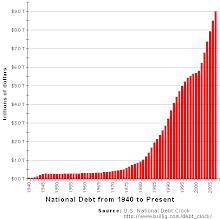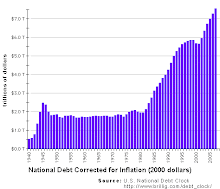
In the October 1, 2009 article "
Bernanke subdued on Fed's consumer protection role," Associated Press economics writer Jeannine Aversa reports:
WASHINGTON – Federal Reserve Chairman Ben Bernanke told Congress Thursday that the central bank is "well suited" to oversee colossal financial companies whose failure could endanger the entire economy.
But his written testimony did not mention the Fed losing some of its consumer protection duties, after the Fed chief previously criticized the Obama administration for its plan to strip the central bank of some of those powers.
Testifying before the House Financial Services Committee, Bernanke said only that protecting consumers from abusive practices involving mortgages, credit cards and other financial products is "vitally important."
In past appearances on Capitol Hill, Bernanke has laid out a spirited defense that the Fed should keep those powers. The administration wants to create a consumer protection agency for risky financial products.
Rep. Melvin Watt, D-N.C., was stunned by what he thought was Bernanke's short shrift to the consumer protection issue. "Five sentences on consumer protection when everything else gets substantially more space," Watt said. "It is just not a good message to send."
During the hearing, Bernanke conceded that the Fed didn't do the job it should have in protecting consumers, but said improvements are being made. He suggested the central bank could take further steps to strengthen such oversight.
"We are competent and have the skills ... I think we can do that," he said.
Bernanke did lay out a case for the additional power over so-called "too big to fail" financial companies, which could include insurance companies, hedge funds and others beyond the big banks traditionally overseen by the Fed. In fielding questions, Bernanke said the "focus" in that regard should remain on financial firms, rather than on other types of companies.
As part of a sweeping rewrite of the nation's financial rule book, the administration has proposed tapping the Fed to regulate those companies, and Bernanke said the central bank has the expertise to best carry out those duties.
For both accountability and effectiveness, that power is "best vested with a single agency," Bernanke said. "I believe that the expertise we have developed in supervising large, diversified and interconnected banking organizations ... makes the Federal Reserve well suited to serve as the consolidated supervisor."
The Fed would be willing to concede some of its bailout power if Congress creates a new mechanism to safely wind down big financial firms on the brink, something along the lines of what the Federal Deposit Insurance Corp. does with banks, Bernanke said. The Fed's bailout of insurance giant American International Group Inc. and its financial backing of JPMorgan's takeover of Bear Stearns angered the public and some in Congress.
On another matter, Bernanke said the Fed is "about to issue" a proposal cracking down on executive pay. It seeks to make sure that bonuses and other compensation don't encourage undue risk-taking that could hurt the company or the larger financial system.
Asked whether a crisis is brewing in the troubled commercial real-estate market, Bernanke responded: "I don't think so. But we'll have to watch it carefully."
To police the broader U.S. financial system for risks, Bernanke supported a council of regulators do that job — also in line with Obama's proposal.
All financial regulators, Bernanke said, should step up day-to-day oversight and have a big-picture approach in this area.
"To further encourage a more comprehensive and holistic approach to financial oversight, all federal financial supervisors and regulators — not just the Federal Reserve — should be directed and empowered to take account of risks to the broader financial system," he said.
Bernanke said potential risks monitored by the council could include significant increases in leverage at companies and gaps in regulatory coverage that can arise when new financial products are created. The Fed chief said a "no doc loan" — where people don't have to document their income to a lender_ would be an example of a risky product. Those loans were made during the housing boom and contributed to the bust.
Bernanke insisted that his endorsement of a council to police risk isn't a shift in his stance. "There has been some misunderstanding ... we support a council ... we never objected to a council," he said.
Both Democrats and Republicans have been loathe to give the Fed additional powers. They argue that the central bank failed to spot problems that led to the financial crisis in the first place.
"We have had debate and will have further debate about exactly what the role of the Federal Reserve will be in the systemic risk regulation. There were some, myself included, who earlier this year thought the Federal Reserve would have a larger role than it looks like it will have," said committee chairman Barney Frank, D-Mass.
 In the October 1, 2009 article "Bernanke subdued on Fed's consumer protection role," Associated Press economics writer Jeannine Aversa reports:
In the October 1, 2009 article "Bernanke subdued on Fed's consumer protection role," Associated Press economics writer Jeannine Aversa reports:





Here comes the fed.
ReplyDelete